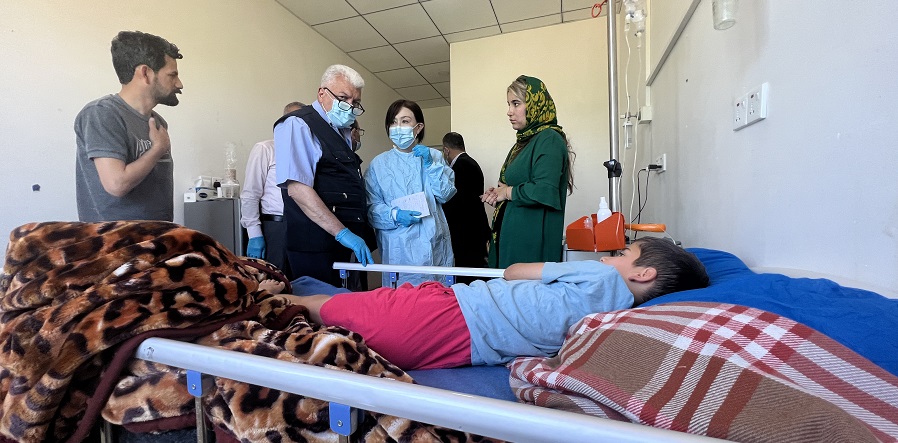 8-year-old Kareem has been undergoing medical treatment for meningitis at Wafaa Hospital in Halabja for 4 days
8-year-old Kareem has been undergoing medical treatment for meningitis at Wafaa Hospital in Halabja for 4 days
Sulaymaniyah, 9 May 2023— Following a surge in meningitis cases in Halabjah City and Sulaymaniyah governorate since mid-April 2023, an expert team from the World Health Organization (WHO) and the Ministry of Health was deployed to the affected areas to perform a joint epidemiological investigation of the reported cases and develop a swift response plan to curb the transmission of the disease.
Preliminary laboratory results from 24 collected samples showed a mixture of bacterial (streptococcus pneumonia) and viral (enterovirus) meningitis, indicating 2 responsible pathogens. Further laboratory investigations are under way for more conclusive results.
The majority of cases occurred in school-aged children, with males affected twice as often as females. The upward trend in cases is still ongoing, with the epicentre of the epidemic located in the centre of Halabja and nearby Serwan City.
“No deaths have been reported so far; nonetheless, it is crucial that we act quickly to detect, confirm and treat cases to effectively curve the transmission and control the outbreak,” said Dr Ahmed Zouiten, WHO Representative in Iraq.
Visits to Wafaa Hospital in Halabja and Dr Jamal Ahmad Rashid's Pediatric Teaching Hospital in Sulaymaniyah showed a sudden increase in meningitis cases in the last 2 weeks, mainly affecting children under 10 years old. Health care professionals have been working tirelessly to treat patients, but challenges such as a critical shortage of staff, essential medicines, and supplies have been observed in both hospitals.
WHO has obtained 20 cerebrospinal fluid samples from the affected hospitals, which will be shipped to a WHO collaborating laboratory for further analysis. In the meantime, WHO ordered rapid diagnostic test kits for meningitis to facilitate the timely identification of causal pathogens and enable prompt public health action.
In collaboration with the Ministry of Health, WHO will organize a multidisciplinary training on meningitis for surveillance staff, health care professionals, and laboratory technicians in Halabja and Sulaymaniyah during the week of 21 May 2023. This training aims to quickly scale up frontline response capacities in the affected areas.
“Our current priority is to curtail the spread of the meningitis outbreak and deliver urgent and effective care to those affected. We are working closely with the WHO team to develop and deliver a robust response, including heightened surveillance and enhanced laboratory capacities,” said Dr Riyadh Al-Hilfi, Director-General of the Public Health Directorate in the Ministry of Health.
Depending on the identified causal pathogen, response strategies may include a pneumococcal vaccination campaign for children, adherence to infection prevention control measures, and enhancing community education and awareness.
“In response to the current outbreak, WHO has already begun to take prompt actions by enhancing the surveillance, data collection and laboratory capacity for and case management,” said Dr Chiori Kodama, Medical Officer, Infectious Hazard Prevention and Preparedness programme at the WHO’s Regional Office for the Eastern Mediterranean.


